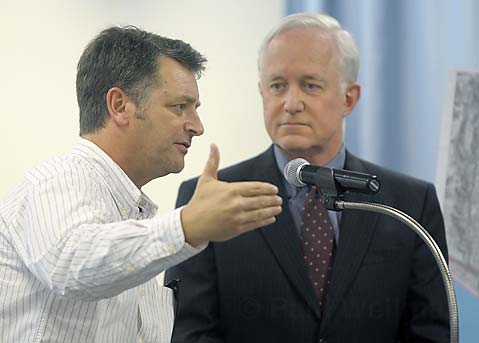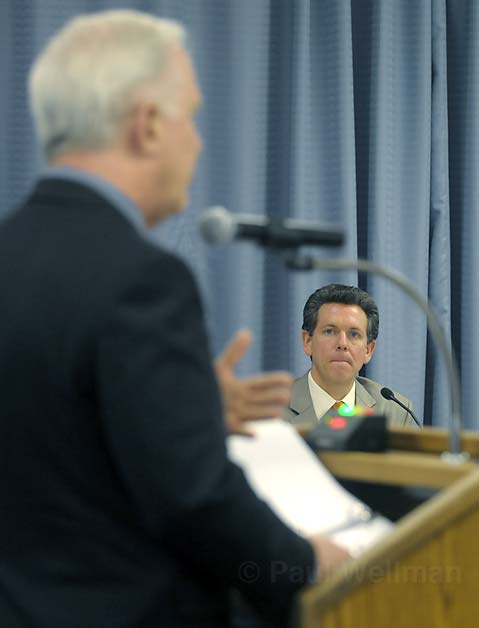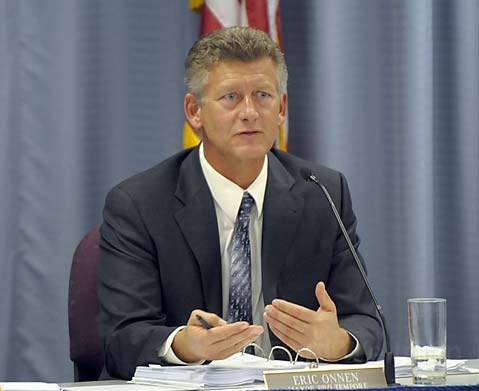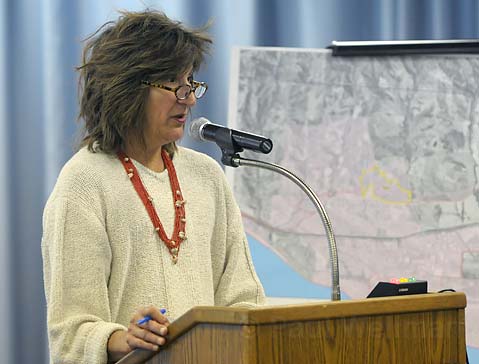Goleta Wants Sanitary District’s Load; Agency Likely to Sue
Affluent Through Effluent

The Goleta West Sanitary District receives $1.6 million a year in property tax revenue, and it has $30 million in reserves, a load of cash that is too much for the City of Goleta to ignore. On Tuesday, the Goleta City Council unanimously voted to start the process by which Goleta would itself take over sewage collection.
If the city successfully “detaches” itself from Goleta West, it will inherit the pipes and pumps that move wastewater, and also a share of the district’s annual revenues and its cash assets-possibly as much as 78 percent of them.
The takeover decision was made at a lengthy council meeting where all the public speakers (about a dozen of them) voiced opposition to the city’s plan to apply for detachment through the Local Agency Formation Commission, or LAFCO, the entity that regulates governmental boundaries in Santa Barbara County. Most people wanted more public discussion on the matter; others expressed satisfaction with Goleta West’s service.

Also speaking against the detachment proposal was legal heavy-hitter Steven Amerikaner, attorney for Goleta West. Amerikaner was persuasive, arguing that Goleta’s sewer rates may go up after the transition. As for the cash reserves, a good chunk of those must be used to pay for a mandated upgrade of the sewage treatment plant. So what appears to be a “pot of gold,” he said, may turn out differently.
“We think the city will be left with a pot, but no gold,” Amerikaner quipped.
Ultimately, the council was convinced to move ahead with an application to LAFCO by the threat that the State of California might, at any moment, swoop in and grab Goleta West’s fat savings account. Indeed, the state has redirected property tax revenue in the past; notably in the financially desperate early 1990s.
Councilmember Eric Onnen made no bones about the fact that the issue was money. He was plain in his response to Hillary Hauser of the environmental group Heal the Ocean. During public comment, Hauser scolded city officials for conducting a “military coup” with their fast-moving proposal. Heal the Ocean wants Goleta West’s reserves to pay for enhanced treatment of sewage water that gets discharged into the ocean off Goleta Beach.
With her trademark in-your-face attitude, Hauser asked if the city would still want to take over wastewater operations if they had to spend every penny on sewage, not other city services as they are planning to do.

An equally strident Onnen said of the money, “That’s a significant motivator.” He went on to chide Goleta West for “hoarding” taxpayer dollars in its reserves. The sanitary district, he said, is “depriving the city of revenues.” Goleta West’s entitlement to property tax income was established before 1978’s far-reaching Proposition 13, putting the special district in the enviable position of receiving a steady stream of general-purpose tax revenue from all properties within its boundaries. Other utilities often have to rely on special assessment fees.
Goleta wants that money for libraries, street lighting, recreation programs, law enforcement, and any other need that must be paid from the general fund. Goleta City Manager Dan Singer said the city is not in a budget deficit, but his staff is preparing for a continued downturn in the economy.
Another factor in this governmental power struggle is the disposition of the Goleta West territory that would be left over if the city detaches. Singer indicated that the County of Santa Barbara may “enjoin” the detachment action, thus taking over the sewage function for Isla Vista and areas to the west and north of the city. The county, then, would get its share of Goleta West’s tax treasure.

If Goleta West survives what critics are calling a “hostile takeover,” it may still perform its sanitation duties, under contract, for the City of Goleta. Or, the entire contract may go to the other sewage agency in the Goleta Valley-the Goleta Sanitary District, which operates the treatment plant where all the valley’s waste ends up.
In the spirit of reconciliation, Councilmember Margaret Connell urged that city representatives sit down and talk to Goleta West before formally applying to LAFCO. She suggested there might be a way to share the tax monies. And instead of facing off on opposite sides of a conference table, she said, “Maybe we can be seated in a circle and have no sides.”
In the end, the council decided to initiate discussions with Goleta West, but also file the detachment application with LAFCO right away. The goal is to have the proposal heard at LAFCO’s March meeting. The Goleta West Sanitary District Board of Directors met on Tuesday night; they will hold a special closed meeting later this week to discuss the agency’s legal options.



